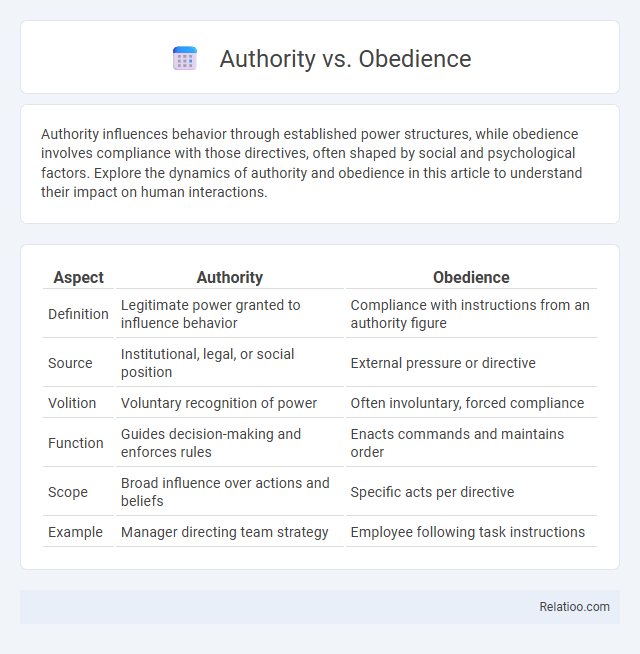Authority influences behavior through established power structures, while obedience involves compliance with those directives, often shaped by social and psychological factors. Explore the dynamics of authority and obedience in this article to understand their impact on human interactions.
Table of Comparison
| Aspect | Authority | Obedience |
|---|---|---|
| Definition | Legitimate power granted to influence behavior | Compliance with instructions from an authority figure |
| Source | Institutional, legal, or social position | External pressure or directive |
| Volition | Voluntary recognition of power | Often involuntary, forced compliance |
| Function | Guides decision-making and enforces rules | Enacts commands and maintains order |
| Scope | Broad influence over actions and beliefs | Specific acts per directive |
| Example | Manager directing team strategy | Employee following task instructions |
Understanding Authority: Definition and Types
Authority refers to the legitimate power or right to give orders, make decisions, and enforce obedience. It can be classified into several types, including traditional authority based on customs, charismatic authority derived from personal appeal, and legal-rational authority grounded in laws and formal rules. Understanding these types helps analyze how individuals respond to commands and the dynamics between authority, obedience, and subjugation in social and organizational contexts.
The Concept of Obedience: What Does It Mean?
Obedience refers to the act of following commands or instructions from an authority figure, often driven by social norms or perceived legitimacy. It involves a voluntary or involuntary submission to rules or orders, which may differ in intent and consequence from authority and subjugation. Understanding obedience helps you recognize the dynamics of control and compliance within social and organizational contexts.
Historical Perspectives on Authority and Obedience
Historical perspectives on authority and obedience reveal how societies structured power dynamics to maintain order and control, with figures like Max Weber defining authority types--traditional, charismatic, and legal-rational--to explain compliance patterns. Studies such as Stanley Milgram's obedience experiments illustrate the psychological mechanisms enabling individuals to follow authority, even against personal morals. Understanding these perspectives helps you critically analyze how authority shapes obedience and the potential risks of subjugation in institutional contexts.
Authority vs Obedience: Key Differences
Authority represents legitimate power granted to individuals or institutions, while obedience is the act of complying with directives issued by those in authority. Your understanding of authority often involves recognition of expertise or social hierarchy, whereas obedience emphasizes behavioral response to commands regardless of personal agreement. The key difference lies in authority's foundation in accepted legitimacy, contrasting with obedience's focus on adherence and compliance.
Psychological Theories Behind Obedience
Psychological theories behind obedience, such as Milgram's experiment, demonstrate how individuals comply with authority figures even against personal morals due to factors like situational pressure and perceived legitimacy. Social identity theory explains obedience through group conformity and the desire to maintain social cohesion under authoritative influence. Cognitive dissonance theory highlights how individuals reconcile conflicting feelings when obeying harmful orders, reinforcing obedience despite internal resistance.
The Role of Authority in Shaping Behavior
Authority significantly influences individual behavior by establishing norms and expectations that guide actions within social and organizational contexts. Psychological studies underscore that perceived legitimate authority increases compliance and reduces resistance, shaping behavior through internalized social roles and power dynamics. This dynamic can lead to obedience that enforces social order but also risks subjugation when authority is unchallenged or abused.
Obedience to Authority: Notable Experiments and Case Studies
Obedience to authority has been extensively studied through landmark experiments such as Stanley Milgram's 1961 shock experiment, which demonstrated individuals' willingness to administer painful stimuli under authoritative pressure. The Stanford Prison Experiment by Philip Zimbardo in 1971 further highlighted how perceived authority roles influence participants to conform to abusive behavior and submissiveness. These studies reveal the powerful psychological mechanisms driving obedience, emphasizing the impact of authority on human behavior and ethical decision-making.
Ethical Implications of Authority and Obedience
Authority establishes structured power crucial for societal order, but its ethical use depends on respecting human rights and dignity. Obedience can promote harmony when aligned with moral principles, yet blind obedience risks enabling unethical actions and injustice. Your critical reflection on where obedience ends and subjugation begins safeguards against abuse and upholds ethical standards in authority relationships.
Balancing Authority and Obedience in Society
Balancing authority and obedience is crucial for maintaining social order while respecting individual autonomy. Effective governance requires authority to be exercised with accountability, ensuring that obedience from citizens is grounded in trust rather than fear. Your role in upholding this balance fosters a society where compliance supports collective well-being without leading to subjugation or loss of personal freedom.
Navigating the Authority-Obedience Relationship in Modern Times
Navigating the authority-obedience relationship in modern times requires a nuanced understanding of power dynamics and individual agency, recognizing that authority must be exercised with ethical consideration to prevent subjugation. Contemporary organizational and social structures emphasize transparency and accountability, promoting obedience based on informed consent rather than coercion. Balancing respect for legitimate authority while resisting unjust subjugation is key to fostering equitable and resilient communities.

Infographic: Authority vs Obedience
 relatioo.com
relatioo.com